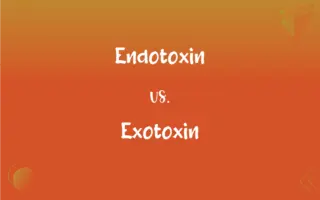Acute Disease vs. Chronic Disease: What's the Difference?
Edited by Janet White || By Harlon Moss || Updated on October 20, 2023
Acute diseases appear suddenly and last a short time, while chronic diseases develop slowly and persist long-term.

Key Differences
Acute diseases emerge rapidly and are often characterized by sharp symptoms that generally last for a brief duration. For example, the common cold or influenza can be classified as an acute disease due to their sudden onset and short-lived nature. Conversely, chronic diseases are health conditions that evolve over a prolonged period and continue to affect an individual for an extended time. Diseases like diabetes or hypertension fall into this category.
The distinction between acute diseases and chronic diseases is not merely about their duration. Acute diseases, in many instances, might be more severe and disruptive in the short term. They might require urgent medical attention but can often resolve with appropriate treatment. On the other hand, chronic diseases might display milder symptoms initially but can have a cumulative effect on an individual's health over time. Management of chronic diseases frequently requires sustained treatment and lifestyle adjustments.
Furthermore, the causes of acute diseases often differ from those of chronic diseases. Acute diseases might result from infections, sudden injuries, or specific triggers. In contrast, chronic diseases often arise due to a combination of genetic, environmental, and lifestyle factors. The lifestyle choices, including diet and physical activity, play a significant role in the risk of developing many chronic diseases.
Ultimately, understanding the difference between acute and chronic diseases is essential for appropriate medical care. While acute diseases necessitate immediate response and quick intervention, chronic diseases demand ongoing management and preventive measures to improve the quality of life.
Comparison Chart
Duration
Short-term
Long-term
ADVERTISEMENT
Onset
Sudden
Gradual
Severity
Can be severe but short-lived
Might be milder initially but can worsen over time
Causes
Infections, sudden injuries, specific triggers
Genetic, environmental, and lifestyle factors
Treatment Approach
Immediate intervention and treatment
Ongoing management, lifestyle adjustments, and prevention
Acute Disease and Chronic Disease Definitions
Acute Disease
A disease with a rapid onset and short course.
Strep throat is an acute disease that resolves with antibiotics.
ADVERTISEMENT
Chronic Disease
A health problem developing over time and lasting indefinitely.
Hypertension is a chronic disease requiring lifelong management.
Acute Disease
A disease that does not last long but may be intense.
A severe flu can be an incapacitating acute disease for several days.
Chronic Disease
A persistent, long-standing medical condition.
Arthritis is a chronic disease affecting many elderly individuals.
Acute Disease
An ailment necessitating prompt medical attention.
A heart attack is a life-threatening acute disease.
Chronic Disease
An ailment often resulting from lifestyle factors and genetics.
Heart disease is a chronic disease influenced by diet, exercise, and heredity.
Acute Disease
A health issue characterized by sharp, pronounced symptoms.
An asthma attack is an acute disease episode demanding quick intervention.
Chronic Disease
A disease characterized by continual or recurring symptoms.
Depression is a chronic disease with episodes of relapse and remission.
Acute Disease
A condition that emerges suddenly and is typically severe.
Appendicitis is an acute disease requiring immediate surgery.
Chronic Disease
A condition typically managed rather than cured.
Type 2 diabetes is a chronic disease controlled with medication and diet.
FAQs
Which has a sudden onset, acute disease or chronic disease?
Acute diseases have a sudden onset.
Which is more influenced by lifestyle choices, acute or chronic diseases?
Chronic diseases are often more influenced by lifestyle choices.
Can an acute disease become chronic?
Yes, if an acute disease isn't treated properly, it can lead to a chronic condition.
Are regular check-ups vital for chronic disease management?
Yes, regular check-ups can help manage and monitor chronic diseases.
Do all acute diseases require hospitalization?
No, not all acute diseases require hospitalization, but some may demand immediate care.
Can one suffer from multiple chronic diseases at once?
Yes, it's possible to have multiple chronic diseases, termed comorbidities.
Is the quality of life often affected by chronic diseases?
Yes, chronic diseases can significantly impact the quality of life, requiring ongoing management.
Can acute diseases be prevented?
Some, like infections, can be prevented with measures like vaccinations and hygiene.
Are infections common causes of acute diseases?
Yes, many acute diseases, like the flu, result from infections.
What's the primary difference between acute and chronic diseases?
Duration and onset: acute diseases are short-term and sudden, while chronic diseases are long-term and gradual.
What's the best approach to tackle acute diseases?
Immediate medical attention and treatment are vital for many acute diseases.
Can chronic diseases ever be cured?
Some can be managed effectively, but many chronic diseases have no cure.
Can you give an example of a genetic chronic disease?
Cystic fibrosis is a genetic chronic disease.
How quickly do symptoms appear in acute diseases?
Symptoms of acute diseases appear rapidly.
How can one prevent the onset of many chronic diseases?
Healthy lifestyle choices, like a balanced diet and exercise, can help prevent many chronic diseases.
Do chronic diseases always show symptoms?
No, some chronic diseases can be asymptomatic or display mild symptoms initially.
Are there support groups for individuals with chronic diseases?
Yes, many support groups assist individuals in managing and coping with chronic diseases.
Are acute diseases always less severe than chronic diseases?
No, acute diseases can be severe but are short-lived.
How significant is early detection in chronic diseases?
Early detection is crucial as it can lead to better outcomes and management for chronic diseases.
Are vaccinations primarily for acute or chronic diseases?
Vaccinations are primarily to prevent acute diseases, especially those caused by infections.
About Author
Written by
Harlon MossHarlon is a seasoned quality moderator and accomplished content writer for Difference Wiki. An alumnus of the prestigious University of California, he earned his degree in Computer Science. Leveraging his academic background, Harlon brings a meticulous and informed perspective to his work, ensuring content accuracy and excellence.
Edited by
Janet WhiteJanet White has been an esteemed writer and blogger for Difference Wiki. Holding a Master's degree in Science and Medical Journalism from the prestigious Boston University, she has consistently demonstrated her expertise and passion for her field. When she's not immersed in her work, Janet relishes her time exercising, delving into a good book, and cherishing moments with friends and family.






































































